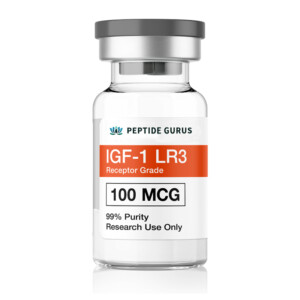In the realm of scientific research, the IGF1-LR3 peptide has emerged as a fascinating subject, especially when it comes to fat metabolism. IGF1-LR3, short for insulin – like growth factor 1 long arginine 3, is a modified form of insulin – like growth factor 1. This peptide has unique characteristics that make it a valuable tool for researchers delving into fat metabolism.
IGF1-LR3’s structure sets it apart from its parent molecule, IGF – 1. It is created by adding 13 amino acids to the N – terminal end of IGF – 1 and substituting glutamic acid at position 3 with an arginine residue. These structural changes result in a peptide that doesn’t bind as strongly to IGF binding proteins as IGF – 1 does. As a consequence, IGF1-LR3 remains in the bloodstream for a significantly longer time – about 120 times longer than IGF – 1. This extended presence in the blood allows it to have a more profound impact on various biological processes, including fat metabolism.
When it comes to fat metabolism, IGF1-LR3 plays a crucial role. It interacts with both the IGF – 1R receptor and the insulin receptor. By binding to these receptors, it enhances the uptake of glucose by muscle, nerve, and liver cells. When glucose is taken up more efficiently, the overall blood sugar levels decrease. This drop in blood sugar acts as a signal for adipose tissue and the liver to start breaking down glycogen and triglycerides. As a result, there is a net decrease in adipose tissue and an increase in energy consumption, which is a key aspect of fat metabolism.
In the context of diabetes, IGF1-LR3’s role in fat metabolism becomes even more significant. Since it can reduce blood sugar levels, it also reduces the need for exogenous insulin. In many cases, it can lead to a 10% decrease in insulin requirements to maintain stable blood sugar levels. This not only helps in managing diabetes but also provides insights into how to better understand and potentially prevent type 2 diabetes. By promoting fat metabolism, IGF1-LR3 may contribute to reducing the risk factors associated with diabetes, such as high blood sugar and excessive fat accumulation.

However, it’s important to note that when conducting research with IGF1-LR3 peptide for fat metabolism, researchers must adhere to the latest FDA guidelines. The FDA strictly regulates the use of research chemicals like IGF1-LR3 to ensure safety and ethical practices. IGF1-LR3 sold by PEPTIDE GURUS is clearly marked for research use only. It is illegal to use this peptide for human consumption or in any non – research – related applications. The FDA’s regulations aim to protect the public from potential harm and ensure that scientific research is conducted in a responsible manner.
In scientific studies, researchers can use IGF1-LR3 to explore different aspects of fat metabolism. For example, they can investigate how different concentrations of the peptide affect glucose uptake and fat breakdown in various cell types. They can also study the long – term effects of IGF1-LR3 on adipose tissue and its impact on overall metabolic health. Additionally, research can focus on how IGF1-LR3 interacts with other hormones and molecules involved in fat metabolism to gain a more comprehensive understanding of the complex metabolic network.
Question: Can I use IGF1-LR3 to lose weight in my daily life?
Answer: No, IGF1-LR3 is only for research use. It is not approved for human consumption or weight – loss purposes in daily life. Using it without proper authorization is illegal and may cause unknown health problems.
Question: How accurate are the results of fat metabolism research with IGF1-LR3?
Answer: The accuracy depends on various factors such as the experimental design, the purity of the IGF1-LR3 peptide (ours is 99% pure), and the proper handling of samples. Following strict scientific procedures can ensure reliable results.
Question: Are there any risks associated with researching IGF1-LR3 for fat metabolism?
Answer: Although IGF1-LR3 generally shows minimal to moderate side effects in animal models, in – depth long – term effects in humans are still unknown. There is also a risk of improper handling, which could lead to inaccurate results or potential harm if not following safety protocols.
PeptideGurus is a leading supplier of American-made research peptides, offering top-quality products at competitive prices. With a focus on excellence and customer service, they ensure a secure and convenient ordering process with global shipping.
CONTACT